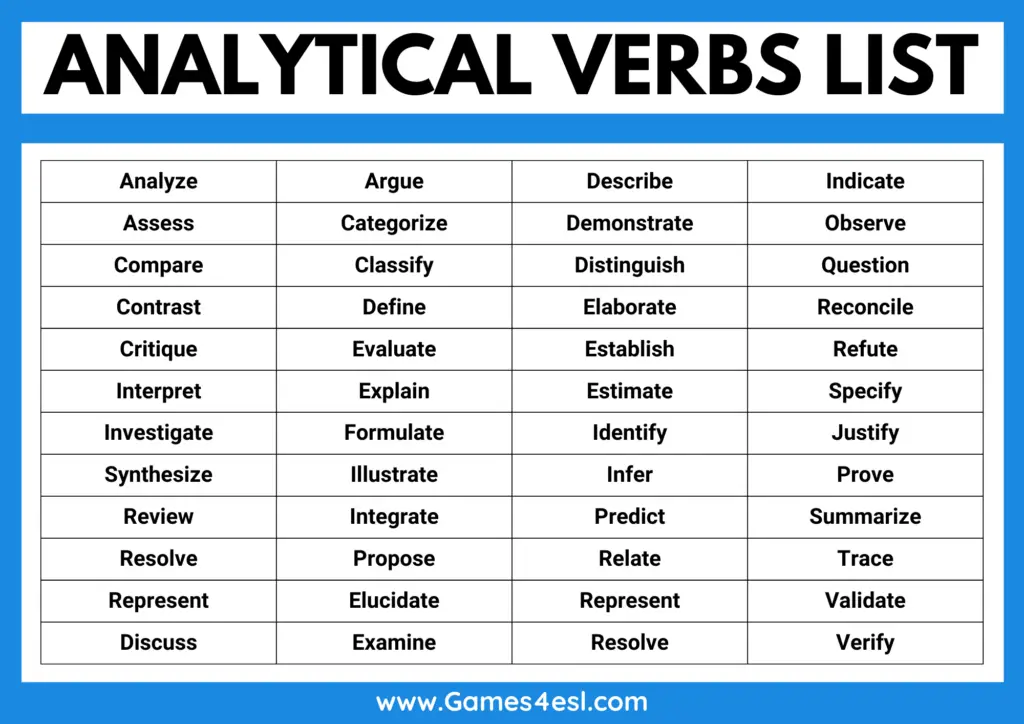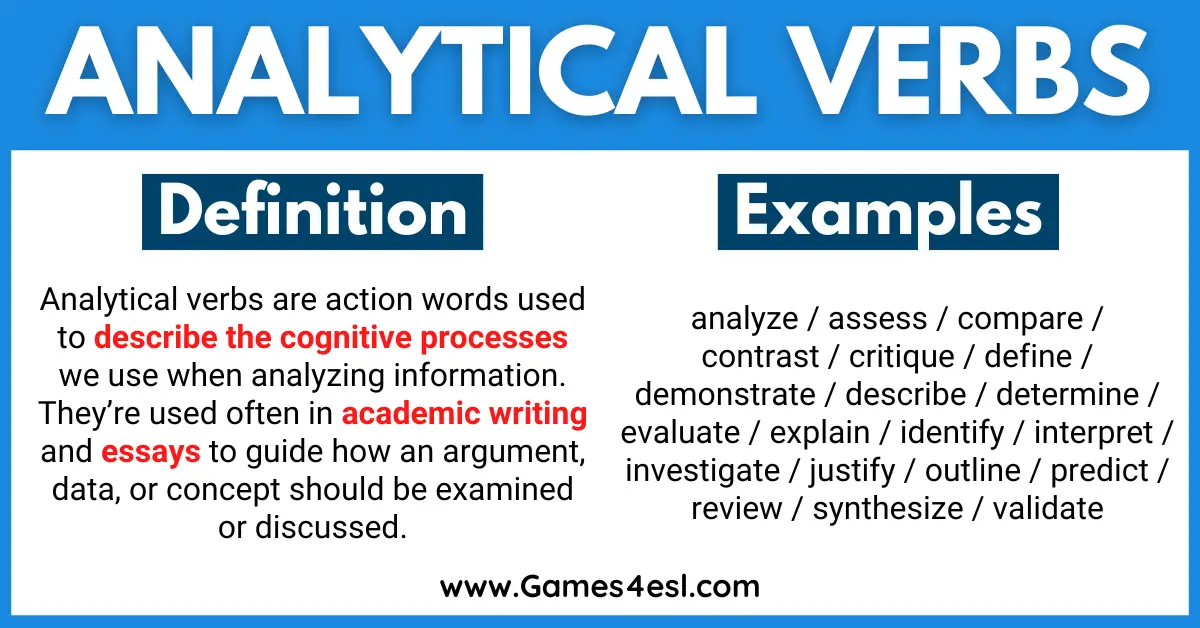Analytical Verbs: Get To Know These Powerful Verbs
Analytical verbs can elevate your English writing and speaking and help you dissect information, present arguments, and convey complex thoughts more clearly. But what are analytical verbs? Analytical verbs are action words used to examine, scrutinize, and interpret data or situations. Examples of analytical verbs include ‘analyze,’ ‘compare,’ ‘describe,’ ‘explain,’ ‘review,’ and ‘validate.’
In this post, we will look in detail at what analytical verbs are and their role in English. We will also provide you with a comprehensive list of analytical verbs and many example sentences so you can discover how to effectively use these analytical verbs in essays and daily speech. First, let’s look in more detail at what analytical verbs are.
What Are Analytical Verbs?
Analytical verbs, also known as ‘process verbs’ or ‘thinking verbs,’ are action words used to describe the cognitive processes we use when analyzing information. They’re often used in academic writing and essays to guide how an argument, data, or concept should be examined or discussed.
Here are 10 examples of analytical verbs:
- Analyze: To break down a concept or data into smaller parts to understand it better.
- Assess: To make a judgment about the value or worth of something.
- Compare: To look for similarities between two or more things.
- Contrast: To highlight differences between two or more things.
- Critique: To make a detailed analysis and assessment of something, especially a literary, philosophical, or political theory.
- Define: To explain the exact meaning of a word or concept.
- Evaluate: To make a judgment about the value, quality, or importance of something.
- Explain: To make clear the details of a concept or data.
- Interpret: To explain or provide the meaning of something.
- Investigate: To conduct a systematic inquiry into a subject to discover or verify facts.
Why Learn Analytical Verbs?
Learning about analytical verbs can improve thinking skills, communication abilities, academic writing, professional development, and overall comprehension of complex ideas. It is essential for English language learners to study analytical verbs for the following reasons:
Critical Thinking:
These verbs help promote critical thinking and analysis. They encourage an individual to go beyond surface understanding and delve deeper into the subject matter.
Academic Writing
In academic writing, analytical verbs are crucial for demonstrating an understanding of the material, formulating arguments, and evaluating different viewpoints. They help to make writing more specific, clear, and impactful.
Communication Skills
Understanding and using analytical verbs can also improve general communication skills. They allow individuals to convey their thoughts more effectively, particularly in discussions or debates.
Reading Comprehension
When reading, recognizing analytical verbs can help understand the author’s intent, whether they’re comparing, contrasting, justifying, etc. This leads to a better understanding of the text. Free Reading Comprehension Worksheets
Standardized Tests & Job Applications
Many standardized tests (like the SAT, ACT, GRE, etc.) and job applications require analytical thinking and the ability to understand and use these verbs. It’s beneficial for test-takers and job applicants to familiarize themselves with these verbs.
Professional Development
In professional settings, these verbs often appear in tasks, assignments, project outlines, and performance reviews. Understanding these verbs can help an individual meet and exceed expectations in their roles.
Analytical Verb List

Here is a list of 50 analytical verbs followed together with example sentences. If you would like to download and print a PDF of this list, you can do so below.
- Analyze: “We need to analyze the data to find a solution to the problem.“
- Assess: “She will assess the situation before making a decision.“
- Compare: “Compare the economic growth of the two countries.“
- Contrast: “He will contrast the philosophies of these two political thinkers.“
- Critique: “The professor asked the students to critique the article for next week.“
- Define: “Can you define what you mean by ‘analytical thinking’?“
- Evaluate: “We will evaluate the effectiveness of the new strategy after six months.“
- Explain: “Can you explain why this theory is important?“
- Interpret: “We have been asked to interpret the results of the survey.“
- Investigate: “The police will investigate the circumstances of the incident.“
- Justify: “The scientist justified his hypothesis with extensive research.“
- Prove: “She needs to prove her theory with solid evidence.“
- Synthesize: “We were asked to synthesize the key ideas from the readings.“
- Argue: “The philosopher argues that morality is subjective.“
- Categorize: “Can you categorize these items according to their size?“
- Classify: “The researchers classify the specimens into several groups.“
- Describe: “Please describe the main events in the novel.“
- Demonstrate: “Can you demonstrate how the formula works?“
- Distinguish: “It’s important to distinguish between correlation and causation.“
- Elaborate: “Could you elaborate on your previous statement?“
- Establish: “The study aims to establish a link between diet and disease.“
- Estimate: “We need to estimate the potential costs of the project.“
- Formulate: “The team will formulate a new plan for the campaign.“
- Identify: “She was able to identify the key trends in the market.“
- Illustrate: “Can you illustrate your point with an example?“
- Infer: “From the data, we can infer a positive trend.“
- Integrate: “The goal is to integrate these concepts into our daily practices.“
- Predict: “Based on the current situation, can you predict the outcome?“
- Propose: “The committee will propose new guidelines for the process.“
- Relate: “How does this chapter relate to the overall theme?“
- Represent: “This painting represents the struggle of the workers.“
- Resolve: “The scientist was able to resolve the problem using a new approach.“
- Review: “Please review the documents before the meeting.“
- Summarize: “Can you summarize the main points of the article?“
- Trace: “We need to trace the history of this idea to understand its origin.“
- Validate: “The experiment will validate the hypothesis.“
- Verify: “We must verify the accuracy of the information.“
- Deduce: “From the evidence, we can deduce that the policy has been effective.“
- Differentiate: “Can you differentiate between these two concepts?“
- Discuss: “We will discuss the implications of the research findings.“
- Elucidate: “The professor tried to elucidate his theory to the class.“
- Examine: “The paper will examine the impact of climate change on agriculture.“
- Highlight: “The report highlights the main challenges facing the industry.“
- Indicate: “The results indicate a significant increase in sales.“
- Observe: “In the experiment, they observed a change in the subject’s behavior.“
- Question: “It’s crucial to question the assumptions behind the argument.“
- Reconcile: “We need to reconcile the conflicting evidence in these studies.“
- Refute: “The author attempts to refute the criticism against his theory.“
- Specify: “Please specify the resources you used for the project.“
- Suggest: “The evidence suggests that the intervention was successful.“
Tips For Teaching And Learning Analytical Verbs

Mastering the usage of analytical verbs can significantly enhance a learner’s English language skills. Here are some effective ways to teach and learn analytical verbs and some ideas on how to incorporate these powerful verbs into everyday language practice.
Regular Practice
The best way to get comfortable with analytical verbs is through consistent usage. Try to incorporate them into your everyday conversations, writing tasks, or academic assignments.
Use Flashcards
Create a set of flashcards with different analytical verbs on each card. Flip them over and try to create a sentence using the verb on the card. This method is especially beneficial for English learners.
Reading and Listening
Reading academic papers, watching debates, or listening to podcasts can provide real-life examples of how these verbs are used in context. Pay special attention to sentences containing analytical verbs.
Teaching Through Context
If you’re a teacher, try to teach analytical verbs within a context. Instead of merely providing a list, use them in sentences, stories, or examples. This strategy can help students understand the meaning and application better.
Encourage Critical Thinking
Strong analytical verbs are often used in contexts that require critical thinking. Teachers should encourage students to use these verbs in essays and assignments to stimulate their analytical thinking skills.
Use in Peer Review Sessions
During peer review sessions, encourage students to use analytical verbs to provide feedback. It will help them to practice using the verbs while enhancing their ability to give constructive criticism.
More Verb Lists
Thanks for reading! I hope you have a better understanding of analytical verbs and find the above analytical verb list useful. Before you go, check out these other useful English verb lists:
Imperative Verb List
Descriptive Verb List
Verbs Of Perception
Stative Verb List
Irregular Verb List


